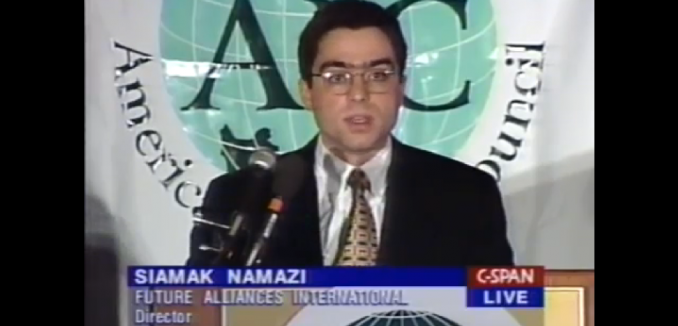Iranian-American father and son Baquer and Siamak Namazi have been sentenced to 10 years in prison on charges of collaborating with a foreign government, the Mizan news agency, which is controlled by the Iranian judiciary, announced Tuesday.
Siamak Namazi, a businessman who advocated for closer ties between the U.S. and Iran, was arrested last year. His lawyer, Mahmoud Alizadeh Tabatabaei, told Reuters in February that he had not received permission to meet with his client, and that Namazi was not aware of the charges against him. Baquer, a former UNICEF representative and provincial governor before the Islamic Revolution, was detained in February and also denied access to a lawyer, Baquer’s wife told CBS.
Three other people were also named in the conviction announcement: two people identified by the initials F.H.A. and A.A., and Nizar Zakka, a Lebanese-born American permanent resident. Zakka, an internet freedom activist, disappeared last September after attending a conference in Tehran at the invitation of one of Iran’s vice-presidents. After his arrest was announced in November, Iranian state media accused him of “deep links” to American intelligence, and showed him in a supposedly incriminating photograph with three other men in military uniforms carrying flags and guns. The picture was actually from his homecoming at his prep school in Georgia.
On Monday, a day before the announcement, Mizan released a video that contained the first footage of Siamak Namazi since his arrest:
Iran has a history of arresting dual nationals; the number reached six in July, which, according to Reuters, comprised “the highest number of Iranians with dual-nationality detained at one time in recent years to have been acknowledged.” One more dual national, a former member of the Iranian nuclear negotiating team, was arrested in August. Many analysts believe that Iran is “seeking concessions from the West in exchange for releasing” dual nationals, the Associated Press wrote that month.
Other dual nationals currently detained in Iran include Nazanin Zaghari-Ratcliffe, a British charity worker who was sentenced to five years in prison earlier this month, and British-Iranian businessman Kamal Foroughi. Canadian-Iranian scholar Homa Hoodfar, who was arrested earlier this year when she returned to Iran to see her family, was released at the end of September, on the same day that Iran announced that it was holding talks with the Canadian government about reopening embassies in each other’s countries. Hoodfar told CBC News after returning to Canada that her interrogators “threatened to send my dead body back to Canada,” and that she was originally arrested for “dabbling in feminism” before having her charges arbitrarily changed to helping a hostile government subvert national security.
Hoodfar’s experience echoed that of Jason Rezaian, the Washington Post reporter who was released in January along with four other American hostages held in Iran (Rezaian is also featured in the video released by Mizan). Rezaian and two family members have filed a federal lawsuit against Iran, claiming that Rezaian was taken hostage and tortured in order to “extort” concessions from the United States during nuclear negotiations. The suit also alleges that Rezaian “suffered such physical mistreatment and severe psychological abuse in Evin Prison that he … will require specialized medical and other treatment for the rest of his life.”
The lawsuit (.pdf) also cited several Iranian officials and sources who asserted that a $400 million payment that Iran received from U.S. on the same day as Rezaian’s release, and then subsequent payments that raised the total to $1.7 billion, were ransom payments for American hostages.
During a televised debate between President Rouhani’s cultural adviser, Hesam al-Din Ashna, and former President Mahmoud Ahmadinejad’s culture minister, Mohammad-Hossein Saffar Harandi, Harandi claimed that the United States paid $1.7 billion in exchange for the hostages—and, in particular, for Jason.
Iran’s Tasnim News Agency stated that “as Iranian and European officials were announcing the implementation of the nuclear deal, the release of the prisoners was taking place” and claimed that “$400 million was delivered to Iran in cash [on] Jan. 17 at Mehrabad airport.”
Javad Karim Ghodousi, a hardline member of Iran’s Parliament, stated that Iran “didn’t give up anything and got everything [in the negotiations]. We gave [up] Jason Rezaian—who/whose usefulness had been exhausted and would have only manifested a loss from then on—and in return we got four concessions. They included the release of seven Iranians from U.S. prisons and the release of $1.7 billion in frozen Iranian assets[.]”
The U.S. government maintains that the payments were components of the nuclear deal that Iran reached with world powers last year. Rezaian’s lawsuit mentioned a claim by Brig. Gen. Mohammad Reza Naqdi, commander of Iran’s Basij militia, who said in January that the $400 million payment “was returned for the freedom of the US spy and it was not related to the [nuclear] negotiations.”
The UK’s Foreign and Commonwealth Office upgraded its travel warning in July, emphasizing that dual nationals may be “arbitrarily detained in Iran.” The UK’s warning is similar to one issued by the U.S. State Department, which warned in August that citizens visiting Iran could be “unjustly detained.”
In Why Does Iran Keep Taking American Hostages?, published in the September 2015 issue of The Tower Magazine, Iran expert Ali Alfoneh described the regime’s detainment of foreign and dual-nationals as “a perfectly normal procedure and political practice in the Islamic Republic. That has been the case since the first day of the revolution and continues until today.”
[Photo: Iran’s New Parliament / YouTube]




